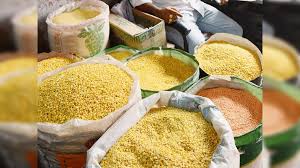Delhi: Around 6.14 lakh metric tonnes of pulses procured at an MSP value of 4280 crores during the Rabi season 2023-24, benefitted 2.75 lakh farmers in the country, the Ministry of Agriculture and Farmers welfare in a statement on Wednesday said.
The statement from the center said, around 12.19 LMT of oilseeds of Rs 6,900 crore of MSP value were procured from 5.29 lakh farmers. During the start of the ongoing Kharif season, market prices of soybeans were ruling much below MSP prices, leading to great hardship to farmers.
With the intervention of the Centre under the PSS scheme (a component of PM AASHA), 5.62 lakh LMT of soybean has been procured at an MSP value of Rs 2,700 crore, as of December 11 this year which has benefited 2.42 lakh farmers. This is also the highest quantity of soybean ever procured.
According to the data from 2018-19, around 195.39 LMT of pulses, oilseeds, and copra have been procured at an MSP value of Rs 10.74 lakh crore benefiting 99.3 lakh farmers under the Centre’s Pradhan Mantri Annadata Aay SanraksHan Abhiyan” (PM-AASHA) scheme.
The statement also said that the government is also promoting a Price Deficiency Payment Scheme (PDPS) as an option for oilseeds. This scheme aims at ensuring remunerative prices to the producers of oilseeds whose MSPs are notified by the Centre.
The PDPS envisages the direct payment of the price difference between the MSP and the selling price in notified markets up to 15 percent of MSP value by the Central government to the pre-registered farmers selling the oilseeds.
Another important component of PM AASHA is the Market Intervention Scheme (MIS) meant for perishable agricultural commodities such as tomato, onion and potato, known as TOP crops not covered under MSP.
“This scheme will immensely benefit the farmers growing these price-sensitive crops and consumers. The scheme is implemented at the request of the state/UT government when there is a reduction of prices in the market by at least 10 per cent over the rates of the previous normal season in the states/UTs,” the statement said.
Under MIS, in place of physical procurement, states may have an option to make a differential payment between the market intervention price and selling price, subject to coverage of 25 percent of the production of crops and a maximum price difference up to 25 percent of MIP.
